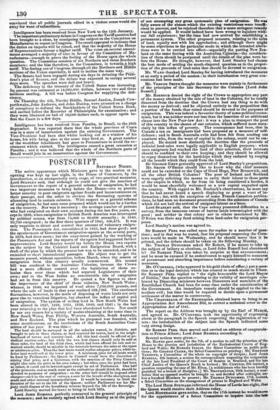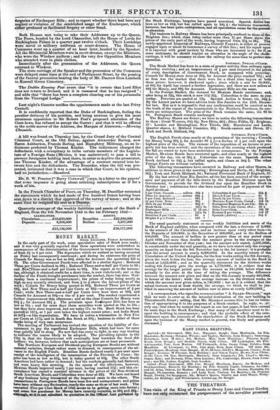POSTSCRIPT.
SATURDAY NIGHT.
The active appearance which Ministers gave to the session at its opening was kept up last night, in the House of Commons, by the Introduction, at an unexpectedly early stage, of two practical measures. Lord STANLEY said, that although he could not give the sanction of Government to the report of a general scheme of emigration, he had two important measures to bring before the House—one to provide better security to poor emigrants against frauds and inconveniences on their passage, and the other to obviate the fluctuating systems of alienating land in certain colonies. With respect to a general scheme of emigration, he had seen none proposed which would not be a burden on the country. Nor was it necessary : the average number of persons who had emigrated on their own account during the last five years, ex- cept in 1838, when emigration to British North America was interrupted by political causes, was from 75,000 to 80,000 annually ; in 1840, 90,700 emigrated ; in the first three quarters of 1841, 106,475. It was only requisite to direct and control that amount of voluntary emigra- tion. The Passengers Act, consolidated in 1825, had done good; and the appointment of Government emigration-agents at the several ports, in 1839, had done more ; but the experience gained by the working of the Passengers Act and the reports of the agents had suggested further improvements. Lord Stanley would lay before the House two reports on the subject by the Colonial Land and Emigration Board, with a draft of the plan by which the present law was to be amended, and to be extended to short intercolouial passages. His object was to get the measure passed, without opposition, before March, when the season of emigration from this country usually commenced. His second bill was confined to the Australian Colonies, because the Crown had a more efficient control over the legislation of those co- lonies than over those which had separate Legislatures of their own ; and to the West Indies no considerable tide of emigration had set in from this country. He quoted a few figures to show the importance of the chief of those colonies, New South Wales ; whence, in 1840, we imported of wool alone 7,668,000 pounds, and where the sale of lands in that year realized 339,7381. The continued fluctuations, however, in the mode of disposing of waste lands not only gave rise to vexatious litigation, but checked the influx of capital and of emigration. The system of selling land in New South Wales bad been altered in 1827, 1828, 1831, 1838, 1340, and 1841 ; in the last year returning to the plan that had been abandoned before. Nor could he see any reason for a variety of modes obtaining at the same time in New South Wales, Port Phillip, Western Australia, South Australia, and New Zealand. The plan which he proposed was founded, with some modifications, on the resolutions of the South Australian Com- mittee of last year. It was this— The land should be surveyed in all the colonies named, in districts, and brought to sale in three classes, as land reserved for towns, land in the neigh- bourhood of towns, and country-land. All this land should be offered at pe- riodical auction-sales; but while the two first classes should only be sold at those sales, the land of the third class, which had been offered for sale and re- mained unsold, should be saleable in the intervals between the sales at the upset or minimum price. Thus the best lands would realize adequate prices, while in- ferior land would sell at the lower price. A minimum price for all lands would be fixed by Parliament : the Queen in Council would have the discretion of raising that price, and a Governor, with the sanction of the Privy Council, might also raise the price in his own colony ; but when once the price had been so raised, it could not be lowered again except by act of Parliament. One half of the proceeds, and as much more as the authorities should think fit, should be devoted to purposes of emigration : on the other half should be imposed other charges—such as the cost of surveys, a sum for the benefit of the aborigines, and roads and other internal communications It would be necessary to limit the duration of the act to the life of the Queen : neither Parliament nor her Ma- jesty could dispose of the hereditary revenue beyond the life of the Sovereign.
Lord Stanley moved for leave to bring in both bills.
Lord JOHN Rosana. perfectly concurred in the general principle of the measure; and ha entirely agreed with Lord Stanley as to the policy
of not attempting any great systematic plan of emigration. He was fully aware of the abuses which the existing restrictions were insuffi- cient to prevent, and he rejoiced therefore that a more stringent remedy would be applied. It would indeed have been wrong to legislate with- out full experience ; but the time had now arrived for establishing a permanent system. The other proposed measure, relating to the sales of land, equally met with his approbation ; and although there might be some objections to the particular mode in which the intended altera- tions were to be carried into effect—especially the putting New Zea- land on the same footing with the Australian Colonies—the considera- tion of them should be postponed until the details of the plan were be- fore the House. He thought, however, that Lord Stanley had chosen the best mode of settling the much-disputed question as to the propor- tion of the proceeds of land-sales that should be devoted to emigration.
Mr. WARD thanked Lord Stanley for having introduced the measures at so early a period of the session : in their introduction very great con- cessions had been made.
Mr. VERNON SMITH thought the measures were mainly in furtherance of the principles of the late Secretary for the Colonies [Lord John Russell.] Mr. ROEBUCK denied the right of the Crown to appropriate any part of the money obtained by the sale of land in the Colonies, for be totally dissented from the doctrine that the Crown had any thing to do with the money so derived; and be objected entirely to the proposition that a portion of the funds thus raised should be devoted to the purposes of emigration. This was indeed a favourite theory of some political econo- mists, but it was neither more nor less than the insertion of an additional clause into the New Poor-law Act : it was a plan to transport the poor of this country to the shores of our colonies, which suffered most mate- rially by this influx of poverty. The consequence had been, that in Canada a tax on immigrants had been proposed as a measure of self- defence ; and in South Australia evils had been felt from sending out numbers who, from the -want of capital in the colony, could not be em- ployed. He denied most distinctly the doctrine that the proceeds of colonial land-sales were legally applicable to English purposes : when once emigrants had reached the land of their selection, their interests should be confided to their own keeping ; and they should be allowed to repay themselves for the hardships which they endured by reaping all the benefit which they could from the land.
Sir GEORGE GREY generally approved of Lord Stanley's propositions.
Mr. Surra O'Bfunn should like to know why the chief measure could not be extended to the Cape of Good Hope, New Brunswick, and all the other British Colonies? The poor of Ireland and Scotland were eagerly soliciting the means to carry their labour to those parts of the empire in which, so far from its being considered a burden, it would be most cheerfully welcomed as a new capital engrafted upon the country. With regard to Mr. Roebuck's observations, he must say that he had never heard a speech displaying so great a want of in- formation for, with the exception of some French Canadian publica- tions, he had seen no document proceeding from the colonists of Canada which did not hail the arrival of emigrant labour as a boon.
Lord STANLEY said, that the Cape colony presented difficulties to a survey, from the immense extent of barren lands intermingled with the good ; and neither in that colony nor in others mentioned by Mr. O'Brien was there any fund arising from land-sales for emigration. pur- poses.
Lord Stanley's motion was agreed to.
Sir ROBERT PEEL was called upon for replies to a number of ques- tions; and in that way he stated, that his proposal respecting the Corn- laws would be made on Wednesday, and he should move that it he printed, and the debate should be taken on the following Monday.
Mr. THOMAS DuNcontnn asked Sir Robert, if he meant to take up the subject of bribery at elections, as Lord John Russell had abandoned it? Sir ROBERT PEEL was taken by surprise at that announcement; and he must be excused if he endeavoured to apply himself to measures of paramount and absorbing importance before considering a variety of measures.
Mr. O'CoNNELL, (who appeared in his gold chain of office,) put a ques- tion as to the legal decision which has created so much alarm in Ulster. Sir ROBERT PEEL replied to "the right honourable the Lord Mayor of Dublin," that the question relating to the validity of marriages cele- brated by Dissenting ministers between Dissenters and members of the Established Church had been for some time under the consideration of the Government. An immediate remedy should be applied to the im- mediate evil ; but time would be required to decide upon a permanent settlement of the matter in controversy.
The CHziecHri.on of the EXCHEQUER obtained leave to bring in an Appropriation Act Amendment Bill, to correct a technical error in the Appropriation Act of 1841.
The report on the Address was brought up by the Earl of Meat's, and agreed to. Mr. O'CoNnsix took the opportunity of expressing alarm at the paragraph in the Speech respecting the registration of vo- ters: the introduction of the subject into the Speech indicated some very strong design.
Sir ROBERT PEEL then moved and carried an address of congratula- tion to Prince Albert ; Lord JOHN RUSSELL seconding it.
Several notices were given— Mr. 13zwEs gave notice, for the 7th, of a motion to call the attention of the House to the practice and jurisdiction of the Ecclesiastical Courts of Eng- land and Wales; Sir ROBERT INGLIS, the Select Committee on public pett- tions ; Sir GEORGE CLERK, the Select Committee on printing; Mr. EMERSON TENSEST, a Committee of the whole on copyright of designs; Lord JOHN RUSSELL, 8th instant, a motion for correspondence respecting the resignation of the late Lord President of the Court of Session in Scotland, and the late Chief Justice of the Queen's Bench in Ireland ; Mr. CURTEIS, 9th instant, a question respecting the case of Mr. Elton, [a midshipman who has been harshly punished for a breach of discipline ;) Mr. BROTHERTON, 10th instant, a reso- lution that no opposed motion be brought on and decided after midnight, un- less a hundred Members be present ; Mr. THOMAS DUNCOMBE, nth Instant, a Select Committee on the management of prisons in England and Wales.
The Lord HIGH &swam) informed the House of Lords last night, that the Queen would receive their Address today.
Lord blonmAGLE gave notice, that on the 17th instant he would move for the appointment of a Select Committee to inquire into the late
forgeries of Exchequer Bills ; and to report whether there had been any neglect or violation of the established usage of the Exchequer, which either produced or facilitated forgery or other fraud.



























 Previous page
Previous page